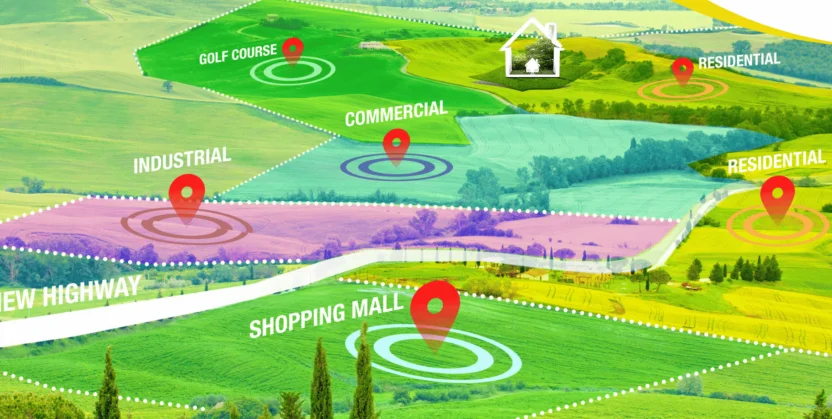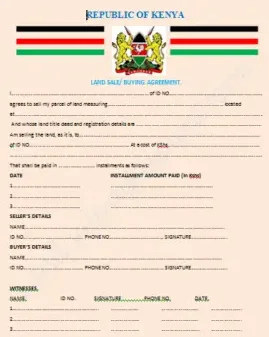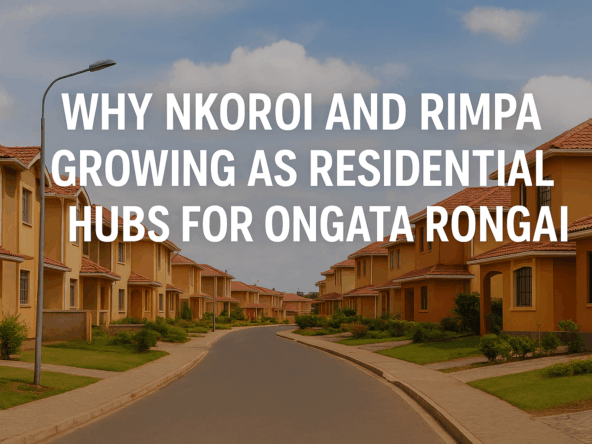Owning land in Kenya is a dream for many. It offers security, investment opportunities, and a sense of accomplishment.
But buying land can be challenging. Many people fall victim to fraud or buy land unsuitable for their needs.
So, how can you avoid these pitfalls and make a smart purchase?
This guide will walk you through every step to confidently buy land in Kenya.
1. Define Your Purpose for Buying Land
Before you start looking, ask yourself: Why do I want to buy land?

Knowing your purpose helps you choose the right location and type of land.
- Residential: To build a home, look for land in a quiet, family-friendly area. Think about schools, hospitals, and shopping centers nearby.
- Commercial: For rental properties, shops, or offices, pick land close to busy towns or growing neighborhoods. Proximity to transport and customers is crucial.
- Agricultural: If farming is your goal, choose land with fertile soil and access to water. Consider the climate and topography.
- Speculation: Buying land as an investment? Research areas with upcoming projects or high growth potential. Places near highways or industrial zones often appreciate quickly.
Your purpose will guide every decision you make.
2. Research the Area
Not all areas are equal.
Take time to research the location. Visit the area, talk to locals, and gather as much information as possible. After your preferred real estate firm has taken you to see the piece of land, revisit the land alone. Your mission is to gather as much information as possible.
Here’s what to look for:
- Amenities: Check how close the land is to schools, hospitals, shopping centers, and transport hubs. These amenities make life easier and add value to the land.
- Infrastructure: Does the area have good roads? What about access to water, electricity, and the Internet? Poor infrastructure can make development costly.
- Security: Is the area safe? Talk to residents and ask them about the security challenges in the area.
- Future growth: Are there planned developments, such as roads, malls, or factories? Such projects can boost the value of your land over time.
Don’t rush this step. A well-researched location can save you headaches later.
3. Set a Budget

Money is a crucial factor when buying land in Kenya.
But it’s not just about the price of the land. Other costs add up quickly:
- Legal fees: You’ll need a lawyer to draft agreements and handle paperwork.
- Stamp duty: This is a government tax, usually 2-4% of the land’s value.
- Land improvements: Think about fencing, clearing the land, or building access roads.
Plan your budget carefully. Explore financing options like SACCO loans, bank loans, or family support.
Tip: Avoid stretching your budget too far—it’s better to save than to struggle financially.
4. Identify Legitimate Sellers or Agents
Not everyone selling land can be trusted. To ascertain the seller’s authenticity, take their identity cards and run a check at the offices of registration of persons.
To verify that the real estate firm or agent is legit, have a copy of their Certificate of Registration and confirm it at the registration of company offices.
Here’s how to find a reliable seller:
- Work with licensed agents or brokers. Ask for their license and credentials.
- Avoid “deals” from strangers or unverified sellers. They may be scams.
- Ask for references from previous buyers. A good agent will have happy clients who can vouch for them.
Do your homework before committing to any deal.
5. Verify the Land’s Ownership
This is one of the most critical steps.
Ask the seller for the original title deed and the green card. The green card holds all original records of all transactions relating to the land. Another crucial document to familiarize yourself is the mutation map and the Registry Index Map (RIM). Then:
- Check that the name on the title matches the seller’s ID.
- Visit the Ministry of Lands and conduct a title deed search.
- Confirm no loans, disputes, or court cases are linked to the land.
While verifying ownership, consider these points;
- If you are buying through a company, you must have an affidavit signed by the board members stating that they know this piece of land is being sold.
- When buying from a family, have an affidavit signed by the other spouse saying that they know the piece of land is being sold and that they are okay with it.
This process may take time, but it’s worth it. You don’t want to pay for land that doesn’t legally belong to the seller. One spouse may be selling the land without informing the other.
6. Confirm the Land’s Zoning Status
Every piece of land in Kenya has a designated use.

In Kenya, every county has its zoning policy. Check with the county government to ensure the land matches your intended purpose:
- Residential: For homes and housing projects.
- Commercial: For businesses, shops, or offices.
- Agricultural: For farming or related activities.
We have a long way to go from proper compliance enforcement to zoning and land use regulations in Kenya.
Some land may have restrictions, like environmental conservation rules. Double-check to avoid future conflicts.
7. Inspect the Land Physically
You can’t skip this step.
Visit the land yourself, preferably more than once. Here’s what to check:
- Boundaries: Are they well-marked? Get a surveyor to confirm the exact boundaries.
- Terrain: Is the land flat, sloping, or rocky? This affects development costs.
- Flooding: Avoid low-lying areas prone to waterlogging or flooding.
- Encroachments: Ensure no neighbors or settlers are using the land.
Seeing the land in person helps you avoid surprises later.
8. Negotiate the Price
Now it’s time to talk money.
Start by researching the average prices of similar plots in the area. This gives you a basis for negotiation.
Be respectful but firm during negotiations. If unsure, involve a trusted agent or lawyer to help you get a fair deal.
When negotiating the price, involve the broker who connected you two. Be open to who will pay the broker and the amount they pocket.
Tip: Don’t be afraid to leave if the seller refuses to budge. There’s always another opportunity.
9. Draft a Sale Agreement
Once you agree on the price, put everything in writing.

Hire a lawyer to draft a sale agreement. This document should include:
- The price and payment terms.
- The plot number and land size.
- Any other conditions agreed upon.
Both parties must sign the document in front of witnesses. This protects both the buyer and seller.
10. Pay the Required Fees
Here’s a breakdown of costs you’ll need to cover:
- Deposit: A percentage of the price paid upfront.
- Stamp duty: A government tax that must be paid before transferring the title.
- Legal fees: Depending on your lawyer, about 1-2% of the land’s cost.
Always keep receipts for every payment. They’re your proof of transactions.
After paying the agreed deposit, book an appointment with the Land Control Board. You and the seller will visit the LCB. The LCB offices will then give you the consent form and allow you two to transact.
You should only pay the total amount after receiving the Consent Form.
11. Transfer the Land Title
Ownership is official once the title is in your name.
Submit the required documents to the Ministry of Lands. These documents are consent forms, duly signed transfer forms, affidavits, old title deeds, passport photos, ID copies, and KRA pin certificates.
The process may take weeks, so be patient.
Once complete, you’ll receive the updated title deed with your name.
Keep this document safe—it’s your proof of ownership.
12. Secure Your Investment

Owning land is a significant achievement, but you need to protect it.
- Fence the land to mark boundaries and keep away intruders.
- Visit the land regularly to ensure no one uses it without your permission.
If you need to develop the land immediately, consider planting trees or grass to maintain it.
13. Avoid Common Pitfalls
Here’s how to avoid common mistakes:
- Never rely on verbal agreements. Always get everything in writing.
- Know the whole process before you start, and don’t skip any.
- Avoid deals that seem too cheap. They’re often scams.
- Confirm the land is free from disputes, loans, or court cases.
- Confirm that the real estate company and the lawyer are legit.
- Have your advocate protect your legal interests.
When in doubt, consult professionals like lawyers or surveyors.
Conclusion
Buying land in Kenya is a significant achievement. However, the process requires careful planning, patience, and due diligence.
Following the steps outlined in this guide, you can avoid common pitfalls, minimize risks, and make informed decisions.
Each step is crucial to ensuring a smooth and successful transaction, from defining your purpose to securing your investment.
Take your time, thoroughly research, and seek professional advice where needed. Investing more in due diligence is always better than losing everything to a bad deal.
Owning land isn’t just about having a piece of property—it’s about securing your future and creating opportunities for yourself and your family. Suitable land can significantly impact your life, whether for a dream home, a business project, farming, or investment.
Are you ready to take this vital step? Start your journey toward land ownership in Kenya today!



